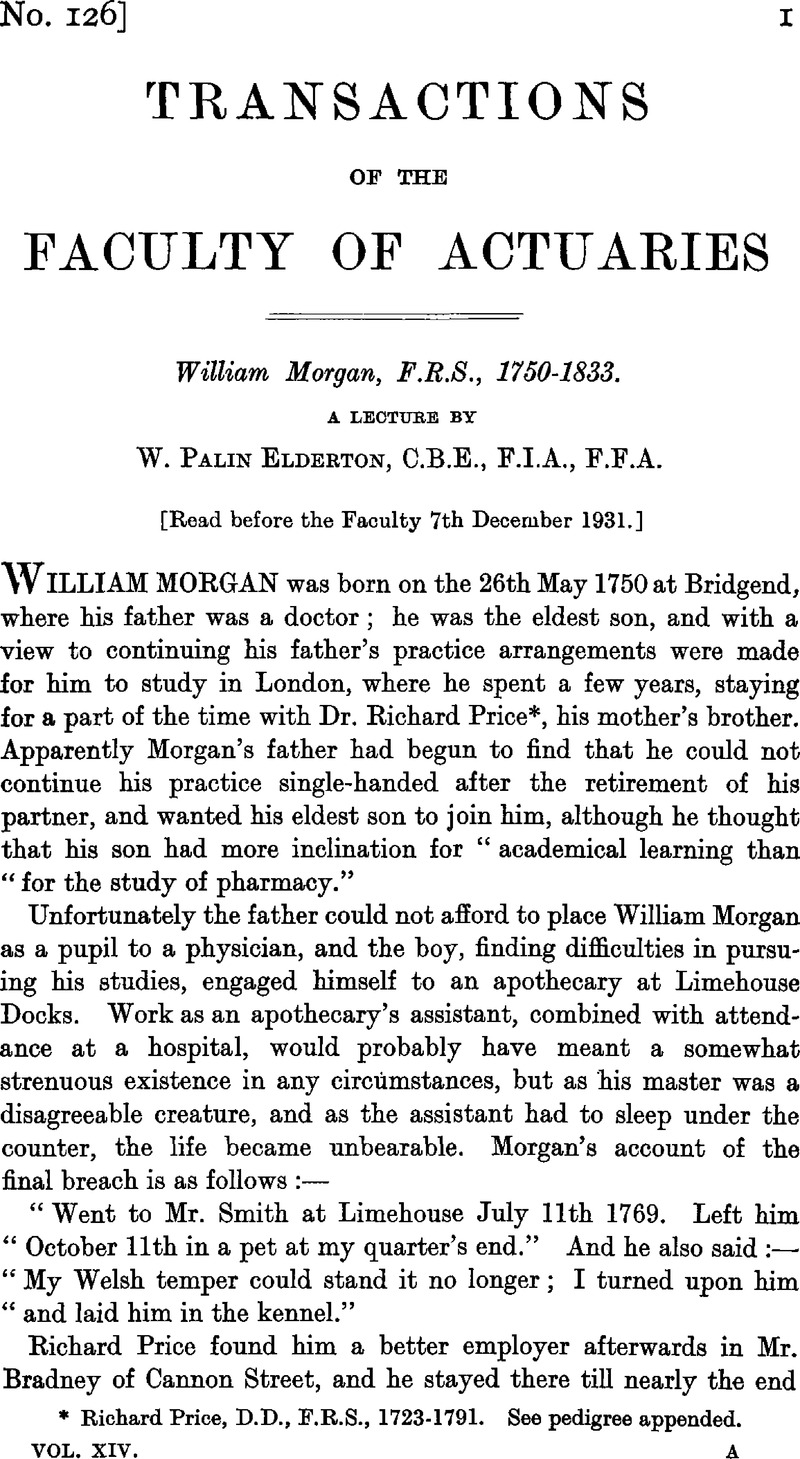No CrossRef data available.
Article contents
William Morgan, F.R.S., 1750–1833
Published online by Cambridge University Press: 07 November 2014
Abstract

- Type
- Other
- Information
- Copyright
- Copyright © Institute and Faculty of Actuaries 1934
References
page 1 note * Richard Price, D.D., F.R.S., 1723-1791. See pedigree appended.
page 2 note * Many years after William Morgan's death his grandson, another William Morgan, familiarly known to his then colleagues as “Bob” Morgan, became assistant actuary. There are confusing references to “Morgan W” in the Index to J.I.A. These refer to W. Morgan, 1750–1833; to Arthur Morgan, 1801–1870: and one to a contribution in 1865 by “Bob” Morgan, 1831–1897.
page 3 note * During Theodore Hook's editorship of the Tory weekly, John Bull, Rogers was an object of personal attack. The following stanzas appeared 7th March 1824, and refer to Rogers' appearance: he was very pale and bald (see Rogers and His Contemporaries, by Clayden, P. W.. London, 1889, vol. ii. p. 132)Google Scholar
HUMAN LIFE.
Cries Sam, “All human life is frail,
E'en mine may not endure ;
Then, lest it suddenly should fail,
I'll hasten to insure.”
At Morgan's office Sam arrived,
Reckoning without his host;
“Avant !” the frightened Morgan cried,
“I can't insure a ghost.”
“Zounds ! 'tis my poem, not my face ;
Here, list while I recite it.”
Said Morgan, “Seek some other place,
I cannot underwrite it.”
page 4 note * The original, painted in 1818, is in the possession of the Equitable Life Assurance Society, with whose consent it is now reproduced. For the successful reproduction I am indebted to W. F. Sedgwick Ltd.
page 5 note * Morgan's predecessors as “actuaries” of the Equitable were Mosdell, who died December 1764; Dodson, son of the mathematician, “but without the “mathematical learning of his father”: he resigned April 1767; John Edwards, who kept the accounts well but did little of importance except that he consulted Price; and, after Edwards' death in December 1773, Pocock became actuary for about a year.
page 6 note * Was the refusal because Tetens had discussed and published commutation columns in 1785 ? Tetens refers to Price's and Morgan's work, so that it would not be improbable that he sent them a copy of his. See F. Hendriks, J.I.A., i. pp. 1 et seq. Morgan had, in effect, used a commutation column in Ch. II. of his Annuities and Assurances, 1779, but did not develop the theory. De Morgan's comments (J.I.A., iv. pp. 185 et seq.) are interesting but seem to be based on conjecture.
page 7 note * In 1817 he gave some opinions, to a House of Commons Committee on the Poor Laws, on allowances for children. I find difficulty in following either the questions asked or the answers he and Baily gave. The arithmetical answers of Morgan and Baily are impossibly different.
page 7 note † It is pleasant to remember that Morgan was helpful in the early stages of the formation of the Scottish Widows' Fund. See J. M'Kean's “Address,” published 1829. The copy I have consulted was presented to “William Morgan, “Esq., F.R.S., with most respectful compts from John M'Kean, Manager.”
page 9 note * My colleague, M. E. Ogborn, however suggests—
1. that the bonus system was devised as an approximation to the division of surplus in proportion to reserve, i.e. to the stake in the Society, which Morgan regarded as fair (see Rise and Progress of Equitable, pp. 57–9);
2. that as the earned interest had generally exceeded 5 per cent., the chief source of profit was interest, and this method of division was so far fair; and there was little objection to the division of lapse profit in the same way;
3. that this approximation to a contribution method helps to account for the bonus system fitting the premiums so well.
A most interesting line of thought.
page 9 note † Morgan draws attention to the fact that variations in mortality and variations in interest may come to the same thing. (Friendly Societies evidence.)
page 9 note ‡ Morgan used Northampton table freely. I have found calculations by him at 4 per cent., and the examples he gives in his addresses and in the Rise and Progress of Equitable generally use it. I have ignored interim bonuses. They were not given at the time the rule was devised. Even when they were started in 1810 they were given in the form of r for each year since the previous valuation (with an adjustment at early duration), so that it would be permissible to assume that they were allowed for in the office single premium used for valuing the sum assured at the attained age.
page 11 note * See King's, G.Textbook on Life Contingencies, pp. 327, 328.Google Scholar
page 13 note * These old profits, or at any rate two-thirds of them, must have been divided long before De Morgan wrote!
page 13 note † Some of the offices formed after the Equitable quoted its success and meant to copy the bonus system, but they lacked the initial restraint in giving bonuses.
page 14 note * It may have been this record that led Morgan to make the following remark when referring to the use of the Northampton table for annuities: “With the least knowledge of the subject, it might easily have been “seen … that the extent of any loss (if it really existed) instead of six “years did not require as many hours to ascertain it” (Rise and Progress of Equitable, p. 5).
page 14 note † Rise and Progress of Equitable, p. 43.
page 15 note * See, for instance, his evidence on Friendly Societies, 1825 and 1827. The 1827 report on this subject discusses mortality and refuses to accept Morgan's remarks about the Equitable, apparently because the Committee or its advisers failed to distinguish between “exposed to risk” and “new entrants.” Morgan held that 1500 exposed in ten years was insufficient to give reliable information as to mortality under 20, and of course he was right. There were 7 deaths under 20, and 37 between 20 and 30.
page 15 note † Rise and Progress of Equitable. Possibly the adoption of the term in the original deed of settlement of the Equitable was due to Edward Rowe Mores (an eccentric antiquarian: see Dict. Nat. Biog.), who seems to have had much to do with the drafting of the deed. His attractive style of writing is traceable in several of the early papers of the Equitable.
In contrast to the “affected appellation,” Morgan on 15th March 1825 before the Committee on Friendly Societies said : “You have, in the Act of “Parliament, made use of the words, two actuaries, or professional men. The “people in the country have taken upon themselves this name. I have had “cases sent me, of club rules and orders, provided by people who call them- “selves actuaries, who are nothing but schoolmasters and accountants, and “some of the tables are exceedingly wrong. The mischief is now very great.”


